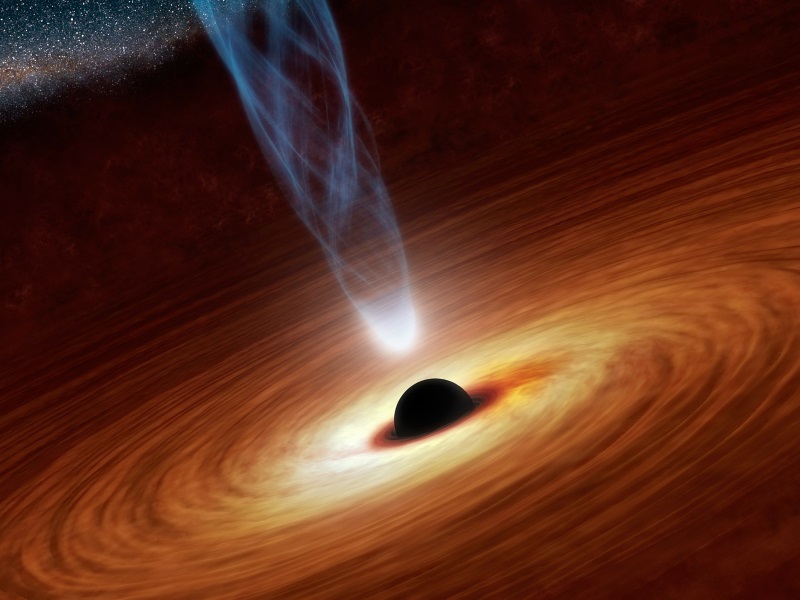- Home
- Science
- Science News
- Black Holes Could Grow as Large as 50 Billion Suns: Study
Black Holes Could Grow as Large as 50 Billion Suns: Study

Professor Andrew King from the University of Leicester in the UK explored supermassive black holes at the centre of galaxies, around which are regions of space where gas settles into an orbiting disc.
This gas can lose energy and fall inwards, feeding the black hole. But these discs are known to be unstable and prone to crumbling into stars.
King calculated how big a black hole would have to be for its outer edge to keep a disc from forming, coming up with the figure of 50 billion solar masses.
The study suggests that without a disc, the black hole would stop growing, meaning 50 billion Suns would roughly be the upper limit.
The only way it could get larger is if a star happened to fall straight in or another black hole merged with it. "The significance of this discovery is that astronomers have found black holes of almost the maximum mass, by observing the huge amount of radiation given off by the gas disc as it falls in," King said.
"The mass limit means that this procedure should not turn up any masses much bigger than those we know, because there would not be a luminous disc," he said.
"Bigger black hole masses are in principle possible - for example, a hole near the maximum mass could merge with another black hole, and the result would be bigger still. But no light would be produced in this merger, and the bigger merged black hole could not have a disc of gas that would make light," said King.
"One might nevertheless detect it in other ways, for example as it bent light rays passing very close to it (gravitational lensing) or perhaps in future from the gravitational waves that Einstein's General Theory of Relativity predicts would be emitted as it merged," he added.
The study was published in the journal Monthly Notices Letters of the Royal Astronomical Society.
Catch the latest from the Consumer Electronics Show on Gadgets 360, at our CES 2026 hub.
Related Stories
- Samsung Galaxy Unpacked 2025
- ChatGPT
- Redmi Note 14 Pro+
- iPhone 16
- Apple Vision Pro
- Oneplus 12
- OnePlus Nord CE 3 Lite 5G
- iPhone 13
- Xiaomi 14 Pro
- Oppo Find N3
- Tecno Spark Go (2023)
- Realme V30
- Best Phones Under 25000
- Samsung Galaxy S24 Series
- Cryptocurrency
- iQoo 12
- Samsung Galaxy S24 Ultra
- Giottus
- Samsung Galaxy Z Flip 5
- Apple 'Scary Fast'
- Housefull 5
- GoPro Hero 12 Black Review
- Invincible Season 2
- JioGlass
- HD Ready TV
- Laptop Under 50000
- Smartwatch Under 10000
- Latest Mobile Phones
- Compare Phones
- Honor Magic 8 RSR Porsche Design
- Honor Magic 8 Pro Air
- Infinix Note Edge
- Lava Blaze Duo 3
- Tecno Spark Go 3
- iQOO Z11 Turbo
- OPPO A6c
- Samsung Galaxy A07 5G
- Lenovo Yoga Slim 7x (2025)
- Lenovo Yoga Slim 7a
- Lenovo Idea Tab Plus
- Realme Pad 3
- Moto Watch
- Garmin Quatix 8 Pro
- Haier H5E Series
- Acerpure Nitro Z Series 100-inch QLED TV
- Asus ROG Ally
- Nintendo Switch Lite
- Haier 1.6 Ton 5 Star Inverter Split AC (HSU19G-MZAID5BN-INV)
- Haier 1.6 Ton 5 Star Inverter Split AC (HSU19G-MZAIM5BN-INV)







![[Sponsored] Haier C90 OLED TV | Dolby Vision IQ, 144Hz OLED and Google TV in Action](https://www.gadgets360.com/static/mobile/images/spacer.png)









